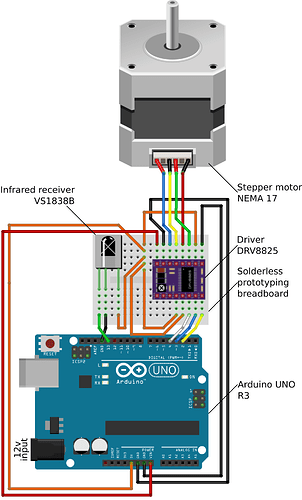Hello, could anyone assist me with an issue I am having with my stepper motor? I am using an Arduino UNO R3. My stepper motor is supposed to rotate when I press buttons on my IRRemote. It glitches and isn't running. Is there a way that I can get it to run, or can someone please proofread my code? The setup image I followed is attached below, along with my code:
#include <AccelStepper.h>
#include "IRremote.h"
int receiver = 13; // Signal Pin of IR receiver to Arduino Digital Pin 6
enum
stepper_Motor {
FUNCTION = 0, DRIVER = 1, FULL2WIRE = 2, FULL3WIRE = 3,
FULL4WIRE = 4, HALF3WIRE = 6, HALF4WIRE = 8
};
#define sleep_pwr 4
AccelStepper stepper_Motor(DRIVER, 3, 2); //stepper(driver, step, dir)
IRrecv irrecv(receiver); // create instance of 'irrecv'
decode_results results; // create instance of 'decode_results'
int stepsPerRev = 200; // Stepper motors are often 200 steps per revolution
int gearRatio = 4; // number of motor rotations required to rotate the drum one full revolution (e.g. motor pulley has 20 teeth, and the drum pulley has 80, so 4:1 ratio)
int microSteps = 16; // this can be manually specified using the "mode" pins on the DRV8825 board:
// M0 M1 M2 RESOLUTION
//------------------------------------------------
// LOW LOW LOW FULL STEP 1 Revolution 200 steps
// HIGH LOW LOW HALF STEP 1 Revolution 400 steps
// LOW HIGH LOW 1/4 STEP 1 Rrevolution 800 steps
// HIGH HIGH LOW 1/8 STEP 1 Rrevolution 1600 steps
// LOW LOW HIGH 1/16 STEP 1 Revolution 3200 steps
// HIGH LOW HIGH 1/32 STEP 1 Revolution 6400 steps
float speedRPM = 1.0; // the speed of rotation. Optomotor experiments often use around 2-4 RPM
float timeRot = 45.0; // number of seconds to rotate in each direction
int nRot = 3; // the number of rotations in each direction
float stepperAccell = 5000; // acceleration and deceleration of stepper motor
int dir = -1; // initial direction: -1 = clockwise, 1 = anticlockwise
int nRem = 0;
//int nDec = 256; // number of decelleration steps when halt/reverse occurs
void setup() {
Serial.begin(9600);
Serial.println("Initialised");
irrecv.enableIRIn(); // Start the receiver
pinMode(sleep_pwr, OUTPUT);
digitalWrite(sleep_pwr,LOW);
stepper_Motor.setCurrentPosition(0);
}
void loop() {
if (irrecv.decode(&results)){ // have we received an IR signal?
Serial.println(results.value);
switch(results.value){
case 0xFFA25D: // power - stop everything!
stepper_Motor.setCurrentPosition(0);
//stepper_Motor.moveTo(stepper_Motor.currentPosition() + (nDec*dir));
nRem = 0;
break;
case 0xFF02FD: // play/pause - switch direction manually
stepper_Motor.setCurrentPosition(0);
//stepper_Motor.moveTo(stepper_Motor.currentPosition() + (nDec*dir));
nRem = nRem+1;
break;
case 0xFF906F: // up
nRem = nRot;
dir = -1;
break;
case 0xFFE01F: // down
nRem = nRot;
dir = 1;
break;
case 0xFF30CF: // 1
speedRPM = 1.0;
break;
case 0xFF18E7: // 2
speedRPM = 2.0;
break;
case 0xFF7A85: // 3
speedRPM = 3.0;
break;
case 0xFF10EF: // 4
speedRPM = 4.0;
break;
case 0xFF38C7: // 5
speedRPM = 5.0;
break;
case 0xFF5AA5: // 6
speedRPM = 6.0;
break;
case 0xFF42BD: // 7
speedRPM = 7.0;
break;
case 0xFF4AB5: // 8
speedRPM = 8.0;
break;
case 0xFF52AD: // 9
speedRPM = 9.0;
break;
case 0xFF6897: // 0
speedRPM = 10.0;
break;
}
irrecv.resume(); // receive the next value
}
if(stepper_Motor.distanceToGo()==0) {
if(nRem > 0){
stepper_Motor.setCurrentPosition(0);
nRem = nRem-1;
dir = dir*-1;
long nSteps = round(stepsPerRev * gearRatio * microSteps * (speedRPM/60) * timeRot * dir);
float stepperSpeed = nSteps/timeRot;
stepper_Motor.setMaxSpeed(stepperSpeed);
stepper_Motor.setAcceleration(stepperAccell);
stepper_Motor.moveTo(nSteps);
Serial.println((String)"nSteps = " + (nSteps));
Serial.println((String)"stepperSpeed = " + (stepperSpeed));
digitalWrite(sleep_pwr,HIGH);
} else {
digitalWrite(sleep_pwr,LOW);
}
}
stepper_Motor.run();
}
